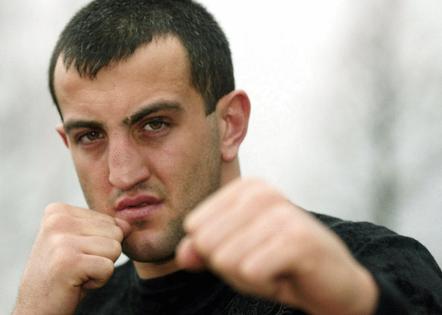3 arrested in plot to bribe NYC juror in boxer Goran Gogic's federal drug trafficking trial
Published in News & Features
NEW YORK — Three people have been arrested in a plot to bribe a federal juror in the upcoming case of Goran Gogic, a former heavyweight boxer accused of playing a key role in a massive international cocaine trafficking ring, prosecutors revealed.
The trial, set to start in Brooklyn Federal Court on Monday, was put on hold, with the jury dismissed — after U.S. Attorney Francisco Navarro told Judge Joan Azrack Monday someone approached a juror and offered a $100,000 bribe to deliver a not-guilty verdict in the case.
Navarro said the FBI arrested three people in connection with the bribe, and that the conspirators appeared to have gotten their hands on a jury list and other information.
“The entire jury needs to be dismissed,” Navarro said. He asked for a anonymous, sequestered jury to take its place. Azrack ordered a status conference in 30 days.
The suspects, Mustafa Fteja, Valmir Krasniqi and Afrim Kupa, are slated to be arraigned in Brooklyn Federal Court later Wednesday. Kupa has a lengthy criminal history with ties to the Gambino crime family, and was released from federal prison in March 2023 after serving a nearly 15-year sentence for drug trafficking and a dramatic bank heist.
Goran Gogic took off his boxing gloves for good in 2012, wrapping up a decadelong, 21-4-2 career in which he knocked out 14 opponents and was knocked out twice in turn.
Gogic’s lawyer, Joseph Corozzo, agreed to the judge’s order and postponement, saying, “We’re just finding out about this this morning.”
Outside the courtroom, when asked if his client had anything to do with the alleged bribe, he said, “The government’s investigating.”
“I’m just extremely disappointed,” he said. “We thought we had a fair and impartial jury.”
According to the complaint, Fteja was already acquainted with one of the jurors and called him several times. On Thursday, the juror agreed to meet him on Staten Island.
At that meeting, Fteja asked for a “favor,” asked if he was on the jury, and offered to pay for a not-guilty verdict, the complaint alleges. He told the juror that Krasniqi and others directed him to make the offer, and that he’d be paid by people from the Bronx.
Phone records show Fteja and Krasniqi were in contact throughout the day Thursday, both before and after the meeting, the feds say.
Fteja was more specific with the bribe during a second meeting with the juror on Saturday, explaining that someone would give him between $50,000 and $100,000, according to the complaint.
By Saturday, the FBI was listening to recordings of Fteja and Krasniqi’s calls, and on Sunday, the feds surveilled a meeting between the two men and Kupa at Krasniqi’s Staten Island home.
“How they gonna pay (the juror), who’s gonna give the money?” Fteja said, and Kupa responded, “Cash,” according to the complaint.
“You’re gonna give it to me? How much?” Fteja asked, according to the feds.
“One, one hundred thousand,” Kupa allegedly responded, and Fteja said. “OK, I dunno, I’ll talk to him again. I will tell him what you told me, and, but, I told you, he’s concerned with those two things, the money and the, and how did they find his name?”
At one point, Krasniqi says, “This has to be done, right?” according to the feds.
Assistant U.S. Attorney Emily Dean referred to the bribe attempt as a “shocking obstruction of justice” at Kupa’s arraignment, asking he be held without bail.
“The defendant and his co-conspirators researched a juror,” she said, adding that they got the juror’s first and last name, and found his home address and place of work.
Kupa is linked to Balkan organized crime and to the Mafia, she said. “The risk of obstruction, of intimidation or worse, is so clear,” she said.
His lawyer, Jeremy Iandolo, countered that Kupa has “never been deemed dangerous.”
Kupa’s criminal record dates back more than three decades. In 1997 and 1998, he and his brother were part of a crew that burglarized or tried to burglarize a string of banks in New York and other states, according to court filings.
In 2010, he and a crew used high-powered drills and blowtorches to break into the roof of an Astoria Federal Savings Bank branch in Brooklyn, and in 2011, he and his brother were among 10 men indicted in a Gambino-linked cocaine distribution ring in Brooklyn and Staten Island.
He was sentenced to 11 years for his role in the cocaine ring, plus nearly four more for the 2010 bank heist.
Krasniqi was also remanded,
“This is a very serious case, and my client is not in the middle of it as they say,” Krasniqi’s lawyer, Mathew Mari, said.
Prosecutors agreed to Fteja being released on $150,000 bond.
Gogic was set to stand trial on charges he was a “critical link” in a massive drug trafficking chain, coordinating between cocaine suppliers in Colombia, cargo ship crew members who transported tons of the drug and port workers in Europe and the U.S.
Authorities in the U.S. made massive seizures as they built the case — more than 1,400 kilos at the Port of New York and New Jersey on Feb. 27, 2019; more than 500 kilos at the Port of Philadelphia on March 18, 2019; and nearly 18,000 kilos at the Port of Philadelphia on June 19, 2019, worth more than $1 billion, in what was described as one of the largest cocaine seizures in U.S. history.
The feds had planned to use messages between Gogic and his co-conspirators as evidence.
Azrack put limits on which messages the government can use, though, only allowing messages that can be independently corroborated by witness testimony.
Gogic remains locked up in MDC Brooklyn, and he’s slated to return to court Dec. 17.
_____
©2025 New York Daily News. Visit nydailynews.com. Distributed by Tribune Content Agency, LLC.







Comments